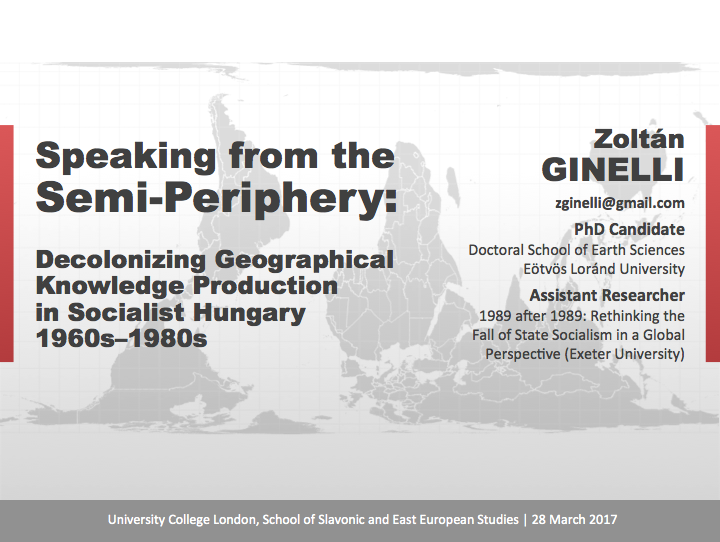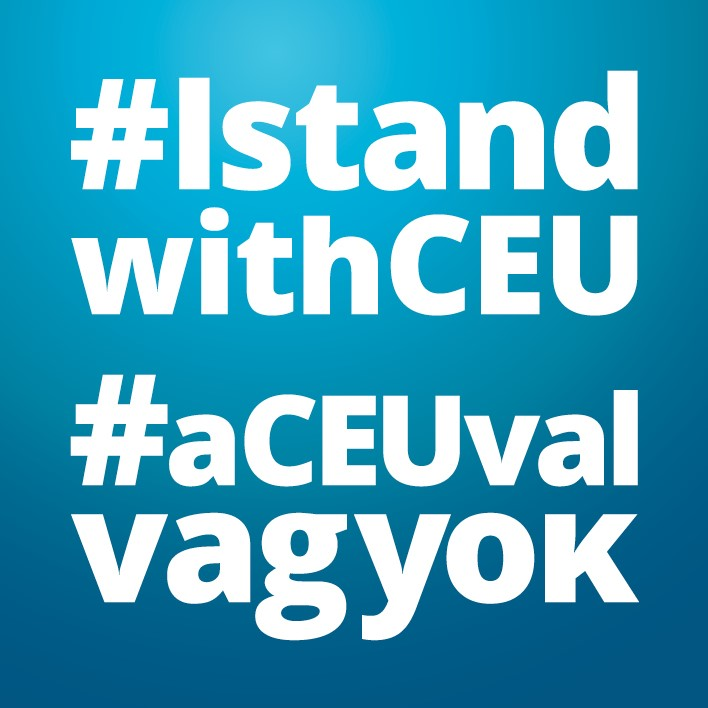Research Plan for the Open Society Archives
Following the line of recent studies on global socialisms and postsocialisms (Apor and Iordachi 2005; Tulbure 2009; Gille 2010; Éber et al. 2014), “socialist globalisation” and “the other globalisers” (Mark and Apor 2014; Bockman et al. forthcoming), this research argues for a global perspective in understanding the interconnected development of the post-WWII Eastern European semi-periphery and the global periphery, by focusing on the case of reform economists and foreign policy in Hungary (Éber et al. 2014; cf. Petrovici 2015).
After de-Stalinisation, the détente period saw an economic upturn in the global economy, the opening up of global diplomatic and trade relations, the international impact of the 1956 revolution, and the process of decolonisation. These developments facilitated “opening up” export-oriented growth strategies, and the simultaneous reconfiguration of transnational networks and global development imaginations in several Eastern European countries, especially Poland and Hungary. More particularly, decolonisation ignited contradictory Hungarian reflections and actions towards affected regions. Behind the facade of ideological fight against imperialism there evolved a realpolitik of manoeuvring between Western and Soviet influences in order to reap the benefits of bilateral trade agreements, and the exporting of expertise, technology, and Hungary’s own models of development. Resulting ideological ambivalences are shown, for example, in that despite the anti-racial condemnation of apartheid, early secret trade negotiations between Hungary had already begun with South Africans in 1960. Semi-peripheral manoeuvring is also evident in the rise of joint development projects between Hungary and Western partners in Africa and the Middle East in the 1970s (Egypt, Algeria, Iraq, Iran, Syria), with a simultaneous shift from communist countries’ pro-Zionist politics towards heavy anti-Zionist propaganda (as facilitators of neocolonialism), which led to Eastern European countries’ breaking off diplomatic relations with Israel due to the 1967 Arab-Israeli War. Foreign political pragmatism is also well captured in the ambivalent Hungarian discourse of Third Worldism, both as a spatial development category and as a “third way” alternative of economic development connected to the Non-Aligned Movement (1961). In the Non-Aligned country of Ghana, Kwame Nkrumah negotiated a vast network of capitalist and socialist experts, especially from Eastern Europe, and assigned a Hungarian delegation of economists led by József Bognár to develop Ghana’s first seven-year plan in the early 1960s. Due to this assignment, Bognár – a close friend of János Kádár – could establish the Centre for Afro-Asian Research (1963/65), whose staff wrote regular reports to the Foreign Ministry, worked on various assignments in international organisations and promoted an active foreign policy and the export-oriented development of Hungary, and a turn towards the decolonised global periphery.
Using contemporary literature in critical geography and international relations, and specifically in postcolonial, decolonial theory and world-systems analysis, this research aims to reassemble the local knowledge production of global geographical concepts and foreign policy information flow in the context of Hungary’s semi-peripheral relations. The reports and collected materials of the Radio Free Europe and the Radio Liberty Research Institute on foreign policy, trade and diplomatic relations offer a glimpse into how concerning actors in the West perceived Hungarian trajectories connected to formerly colonized and “underdeveloped” regions. This should offer clues into their focus and available information, and allows for the comparison of their monitoring activities with official foreign policy documents (e.g. national strategies, delegation reports). With the aim of reviewing delegations and international projects of experts, education, trade, and media coverage until the end of the 1970s, this research wishes to focus on three main aspects.
First, it aims to understand how Hungarian reform economists and politicians after de-Stalinization developed alternative geographical concepts of socialist globalization. Breaking off from Cold War conceptual dichotomies, they opted to reposition their country in the global development hierarchy of centre-periphery relations and reap the political economic benefits of decolonisation, in order to tackle increasing global competition and world economic restructuration, and to enable the successful integration into the world economy. By the late 1960s and the 1970s, new comparative analytical concepts such as “semi-periphery” (Szentes 1971), “small economies” (Kádár 1971), “open economies” (Kozma 1980) had emerged at the CAAR and its successor, the World Economic Institute (1973–) and related institutions and ministries. It is worth noting that most members of the research staff conflicted with Party orthodoxy, and used their scientific activities to propose policy reforms under Bognár’s political “shield”. The OSA materials provide a fruitful empirical ground to scrutinize the political efforts of these reform economists (especially József Bognár), and their strategies to influence and develop connections with politics and media, mediating between Hungarian and Third World political events.
Second, this research aims to unravel the much-overlooked global historical interconnectivity of the Second and Third Worlds, and the foreign economic connections and exchange between semi-peripheral development models (Chari and Verderi 2009; Ward 2010; Mark and Apor 2014). As Eastern European reformers pushed towards “market socialism”, the acquiring of advanced technology and foreign currency from the West implied finding ways to finance development either through foreign loans or export-oriented growth. This facilitated strategies of exporting expertise and investments into the Third World, gathering raw materials to downplay Soviet resource dependency, and to seek or exchange state-led development models, such as in the cases of Francoist Spain, Allendist Chile, and the authoritarian models of the “East Asian Tigers” (Bockman et al. forthcoming).
Third, reformist ambitions generated virulent debates connected to the country’s shifting foreign trade policies and lobbying activity in international organizations (UNCTAD, UNIDO, UNITAR, GATT, Third World Forum), manoeuvring the semi-peripheral country between “East” and “West” to gain investment and trade benefits. In the context of decolonisation and the opening up of global politics with the participation of new geopolitical actors, Eastern European socialist countries used various strategies to reposition themselves between “developed” and “undeveloped/developing” countries in their individual urge to “catch up” with the West. Thus Hungarian negotiations of trade relations with decolonised countries aimed to transcend Soviet influence, CMEA integration, national political regimes and boundaries.
The output of this research aims to contribute to recent literature on the theoretical and methodological approaches of transnational or global history (Conrad 2016), postcolonial and decolonial theory (Moore 2001; Chakrabarty 2007; Boatca and Costa 2012), and world-systems theory (especially the works of Wallerstein, Frank, and Chase-Dunn) in order to understand the emergent strategies of Hungarian knowledge production in the interconnected transnational networks of centre-periphery relations (Powell 2007; Ward 2010; Keim 2014). It also aims to highlight the very early trajectories of reform economists’ “market socialism” in a global perspective (cf. Bockman 2011), and how Hungarian reformist thought was influenced by postcolonial contexts and the transnational exchange of geographical development models, which had important intellectual and political continuities into the post-1989 era. Moreover, Hungarian foreign policies and investment strategies of the 1970s in the Third World had a huge effect on the economic crisis after the 1989 system change; for example, Middle East countries indebted to Hungary became insolvent after constant war and the fall of their authoritarian regimes. The above historical contexts are also illuminating with regards to the post-2010 “global opening” proposed by Prime Minister Viktor Orbán, which curiously referred to the historical accomplishments of Hungarian foreign policies, consequently following the semi-peripheral path of manoeuvring between “East” and “West” and strategically investing capital and exporting expertise in the countries of the global periphery.
References
Boatca, M., Costa, S. (2012): Postcolonial Sociology: A Research Agenda. In: Rodríguez, E. G., Boatca, M. (eds.): Decolonizing European Sociology: Transdisciplinary Approaches. Farnham and Burlington: Ashgate Publishing.
Bockman, J. (2011): Markets in the Name of Socialism: The Left-Wing Origins of Neoliberalism. Stanford: Stanford University Press.
Bockman, J., Feygin, Y., Mark, J. (forthcoming): The Soviet Union, Eastern Europe and Alternative Globalisations 1950s–1980s. Manuscript.
Chakrabarty, D. (2007): Provincializing Europe: Postcolonial Thought and Historical Difference. Princeton: Princeton University Press.
Chari, S., Verdery, K. (2009): Thinking Between the Posts: Postcolonialism, Postsocialism, and Ethnography after the Cold War. Comparative Studies in Society and History, 51(1): 6–34.
Conrad, S. (2016): What is Global History? Princeton: Princeton University Press.
Éber, M., Gagyi, Á., Gerőcs, T., Jelinek, C., Pinkasz, A. (2014): 1989: Szempontok a rendszerváltozás globális politikai gazdaságtanához. Fordulat, 21.: 10–63.
Gille, Z. (2010): Is there a Global Postsocialist Condition? Global Society, 24(1): 9–30.
Kádár, B. (1971): Kis országok a világgazdaságban. Budapest: Közgazdasági és Jogi Könyvkiadó.
Keim, W., Celik, E., Erche, C., Wöhrer, V. (eds.)(2014): Global Knowledge Production in the Social Sciences: Made in Circulation. Corchester (UK): Ashgate.
Kozma, F. (1980): A nyitott szerkezetű gazdaság. Budapest: Kossuth.
Mark, J., Apor, P. (2014): Socialism Goes Global: Decolonization and the Making of a New Culture of Internationalism in Socialist Hungary, 1956–1989. The Journal of Modern History, 87: 852–891.
Melegh, A. (2006): On the East-West Slope: Globalization, Nationalism, Racism and Discourses on Central and Eastern Europe. Budapest: CEU Press.
Melegh, A. (2015): Globális ötvenes évek. Eszmélet, 27(105): 182–191.
Moore, D. C. (2001): Is the Post- in Postcolonial the Post- in Post-Soviet? Toward a Global Postcolonial Critique. PMLA, 116(1): 111–128.
Petrovici, N. (2015): Framing Criticism and Knowledge Production in Semi-peripheries: Post-socialism Unpacked. Intersections, 1(2):
Powell, R. C. (2007): Geographies of Science: Histories, Localities, Practices, Futures. Progress in Human Geography, 31(3): 309–329.
Tulbure, N. (2009): Introduction to Special Issue: Global Socialisms and Postsocialisms. Anthropology of Eastern Europe Review, 27(2): 1–18.
Szentes, T. (1971): The Political Economy of Underdevelopment. Budapest: Akadémiai Kiadó.
Ward, S. (2010): Transnational Planners in a Postcolonial World. In: Healey, P., Upton, R. (eds.): Crossing Borders: International Exchange and Planning Practices. London and New York: Routledge. 47–72.

